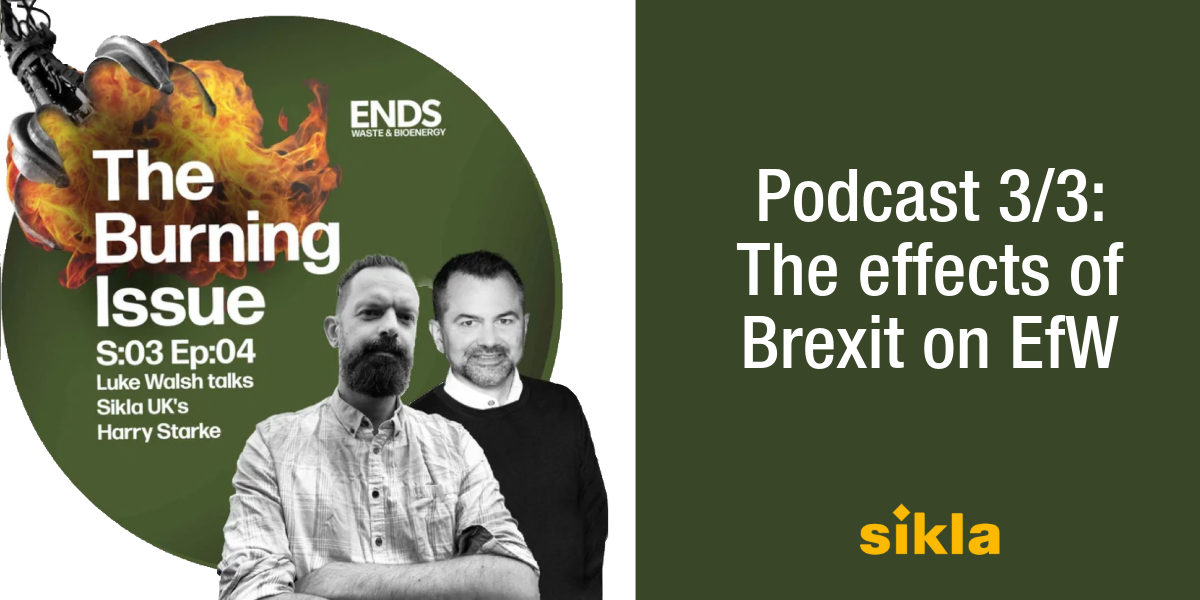By Sikla UK Oceania on 05 July 2024
The effects of Brexit has made trading with the European Union (EU) difficult however it has benefited the Energy-from-Waste (EfW) market within the UK. Part 3, looks into the effects of Brexit in further detail.
In this blog series, we are sharing with you the transcript of the podcast Sikla UK Managing Director and Head of Sales Region, Harry Starke recorded with Luke Walsh, Editor of ENDS Waste & Bioenergy. If you missed the first parts, read them here:
Should you want to the full episode (S03: Ep04), rather than read the transcripts, you can do here on Spotify.

-1.png?width=1200&length=1200&name=My%20project-1%20(4)-1.png)

siFramo pre-fabricated frames ready for dispatch to an EfW site
Luke Walsh (LW) – We are a few years into Brexit now. You have a different experience of it not coming from the UK originally. How do you see trading with the EU going for us now in terms of energy from waste? Are we over the worst of it now?
Harry Starke (HS) - I do not know. At least it has been recognised that it has been the wrong path. It is the elephant in the room, isn't it? Politicians have not understood that it is something that they could easily raise. They are just afraid of the electorate. They are afraid of touching something that would again stir division.
I have lived in this country for more than 20 years and the mentality was alien to me when Brexit came up in the first place. There was one guy, I forgot the name, who explained it to the Europeans. He said: if you ask British people for Brexit, that is like asking kids whether they want chocolate.
The mentality here, that is hard for people like me to understand, but I accept and respect them. Everything that those who knew said is going to go wrong has gone wrong. The amount of paperwork we must deal with just to get our European manufactured product into the country is just mind boggling.
The funny thing is, and this is the silver lining because we are here in a podcast on energy from waste, I believe that has fuelled that industry because there is also a lot of waste being exported to European plants. I read once in one of your publications that it has got to do with Italy, or Germany, or France, having far more recycling. It means that the mix of black sack waste is not as incinerable as it is here because lots of stuff has been taken out already. The fact that you cannot send it to Europe anymore leaves us in the UK with all the waste that we used to send to them and cannot anymore. As a journalist you must know better than me: this is one of the factors why plants that have been on the back burner for so long, suddenly got approved after Brexit. There is high pressure to get rid of the waste.
LW - It does make sense. A lot of plants got approved post-Brexit and did move to financial close just after it. If there is a silver lining of Brexit, it is that those projects got completed.
We are near the end now and there is one thing I wanted to ask you. Your background was in tools and it is like energy from waste, not the sexiest industry for young people to go into. Do you feel that the manufacturing, the industrial side and the tool side is creating people that want to come into the industry like yourself now.
HS - I am in my 50s and I remember that when I was 16, I had to decide how I launch my career and I had no idea what to do. My dad was the one who said you need to do toolmaking because that will always be needed. My concept of tool making was that I thought of a hammer and a drill. Most people do, unless you are from this metal fabricating industry.
What it really means is complex mechanical devices that would produce a car door, for example, or a bathtub within seconds. Tools as big as a small bedroom where a metal sheet is being fed through and then it produces shapes and cut outs.
This is usually something that a team of toolmakers do together, a bit like a construction project, and that is how I used to work at the beginning of my career. Therefore, I would disagree, it is something quite exciting and we live in times of labour shortages. It is something that is especially exciting for anyone who is technically interested. The industry just has to promote it. There is so much computer technology these days that makes it even more exciting. We did CNC already more than 30 years ago. I am sure that this is now even more exciting in terms of all the virtual reality opportunities you have got today and that we did not have at the time.
This heritage is still beneficial for me because we have a product system that is like a big Meccano kit. Whenever we have a new component, I look at it and I know immediately how you make it, because I know how steel is being fabricated in different forms. It is also quite beneficial when it comes to things like customised components that we often require. EfW plants are so different to normal construction projects, and I can see what component it is that we need, but do not have yet. I look at the design and know immediately what kind of companies we have to make our enquiries with.
LW - We have had two positive discussions there after some not so positive things about the industry. At the end of this podcast, the question I ask everyone is, what is the question I should have asked you and how would you have answered it?
HS - The question you should have asked is what the point of using Sikla is. I think that clients of all walks of construction projects want to achieve two things: finishing the project within budget and within the timeline. With Energy from Waste, this is even more important. There is a lot of money at stake if it cannot be handed over on time.
I do believe that at Sikla, because it is such an important link between the building structure and all these services that have to be fitted in there, we can help clients to achieve these two major objectives: finishing on time and within budget.
LW - Finishing on time and within budget, which is a good way for us to end our talk today. That is left to be said, thank you very much, Harry, for joining me.
HS - You're welcome. Thanks, Luke.
Would you like to know more about how Sikla can support you in your next Energy-from-Waste project?
Sikla UK are leaders within the Sikla group for power generation projects and can support any project across the globe. View our references here or contact our specialist in Energy-from-Waste projects:
Global Key Account Manager | Energy-from-Waste
+44 (0) 7912 290 386
Written by Sikla UK Oceania


 Lucia Giraudo
Lucia Giraudo

Comments